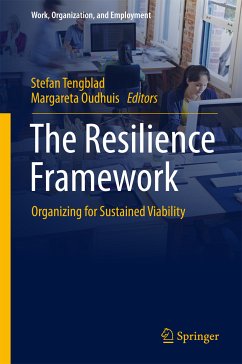This book puts forward a carefully crafted theoretical framework that makes a substantial contribution to the field of organizational resilience. It is a framework that goes far beyond the traditional crisis management perspective (accidents, scandals, etc) to an investigation of the characteristics and factors that make organizations viable over time. The book creates a much-needed link between human resource management and organizational development on the one hand, and the literature about risk and crises management and resilience engineering on the other.
The book assembles several robust social science theories such as evolutionary theory, complexity theory, and institutional theory, as well as concepts from management theory such as followership, organizational trust, open innovation, and serendipity management into a coherent framework. It also integrates important models from the field of resilience engineering that have not previously been included in there
search on organizational resilience. Several new models are used to present the theoretical framework, models that have relevance for researchers as well as practitioners. In addition to the theoretical framework, all chapters are set in various practical environments that both illustrate the use of resilience resources and align with the framework itself.
Dieser Download kann aus rechtlichen Gründen nur mit Rechnungsadresse in A, B, BG, CY, CZ, D, DK, EW, E, FIN, F, GR, HR, H, IRL, I, LT, L, LR, M, NL, PL, P, R, S, SLO, SK ausgeliefert werden.
Hinweis: Dieser Artikel kann nur an eine deutsche Lieferadresse ausgeliefert werden.


